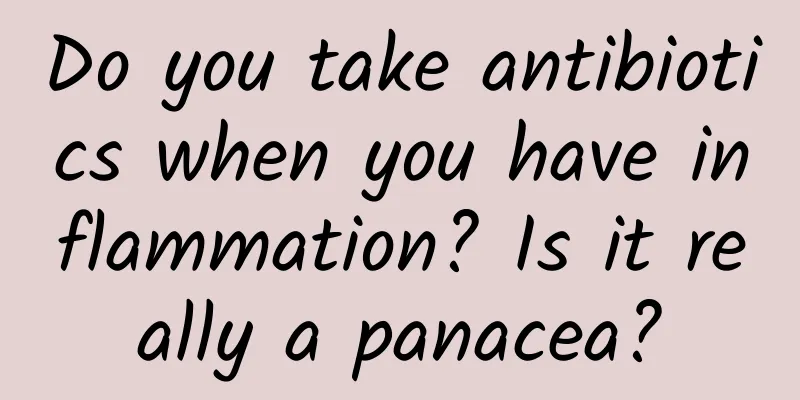Do you take antibiotics when you have inflammation? Is it really a panacea?

|
When you have a cold or fever, some people’s first reaction may be to use antibiotics. When you have a toothache or diarrhea, some people may also think of antibiotics first... What exactly are these “antibacterial drugs” that seem to be omnipotent? When should antibiotics be used? 1. Antibacterial drugs ≠ anti-inflammatory drugs Antibacterial drugs are only effective against bacterial infections. Most "inflammations" are not caused by bacterial infections. For example, rheumatoid arthritis requires anti-inflammatory treatment with non-steroidal anti-inflammatory drugs such as aspirin; allergic rhinitis should be treated with anti-allergic drugs, hormones and other drugs. 2. Antibacterial drugs ≠ cold medicine Colds are caused by a variety of viral infections, and antibiotics are ineffective against cold viruses. During a cold, some symptomatic treatment drugs can be used. For example, if you have headaches and body muscle aches, you can use antipyretic analgesics such as acetaminophen and ibuprofen. Only when you have frequent coughs after a cold, accompanied by yellow, thick sputum, fever, sore throat, etc., and secondary bacterial infections occur, will doctors choose appropriate antibiotics for treatment according to the condition. 3. Do I need to take antibiotics for cough and diarrhea? There are many reasons for coughing, such as viral infection, asthma, cold air stimulation, etc. Bacterial infection is only one of the reasons. In addition to bacterial infection, diarrhea can also be induced by cold, viral infection, food allergy, etc. It is reasonable to use antibiotics to treat cough and diarrhea only when they are caused by bacterial infection. 4. Do I need to use antibiotics after tooth extraction? Whether antibiotics are needed after tooth extraction depends on the bad tooth and the patient's general condition. If the tooth extraction process is simple and the patient is in good physical condition, no antibiotics are needed; if the tooth is inflamed, the tooth extraction causes great trauma, or the patient has poor resistance, antibiotics can be used under the guidance of a doctor. How long do antibiotics need to be used? "All medicines are poisonous", it is wrong to stop taking antibiotics when the symptoms of infection improve slightly. Little do we know that the "symptoms" we call are actually the manifestations of the disease. If the medicine is stopped when the symptoms of infection are alleviated, the bacteria in the infected area will not be completely eliminated, and it is very likely to become a chronic infection. It is like a pile of ashes, there is no spark on the surface, but the inside has not been completely burned. Once there is wind, it may become a "raging fire". Some people also think that the longer you take antibiotics, the better, because they can kill bacteria more thoroughly. This idea is also wrong. Each antibiotic has a different antibacterial spectrum. For infectious diseases, the site of infection, the amount of infected bacteria, and the type are all significantly different. You must follow the doctor's instructions and do not extend the use of antibiotics at will. There are abundant microorganisms in the human body, and the abuse of antibiotics may lead to dysbacteriosis, antibiotic-related diarrhea, dysbacteriosis, pulmonary fungal infection, severe drug-resistant bacterial infection and other adverse consequences. Antimicrobial drugs are a double-edged sword Proper use of antibiotics can quickly kill pathogenic bacteria and allow our bodies to recover quickly. On the contrary, improper use of antibiotics will threaten our health and disrupt the body's normal flora. While killing bacteria, antibiotics can also cause damage to the human body, affect liver and kidney function, and cause gastrointestinal reactions. 1. Follow your doctor’s advice Listen to your doctor, take medicine according to the complete prescription, use antibiotics in sufficient doses and for sufficient courses, do not buy antibiotics at will, and do not take antibiotics at will. 2. Love hygiene Wash your hands frequently to maintain hygiene and avoid bacterial infection. 3. Exercise more Do more exercise to strengthen your body and enhance your resistance. |
<<: The seeds of cranberries grown in the "Easternmost Part of China" are actually "chosen by God"!
>>: Your brain works harder than you think to tell you the order of time
Recommend
There are four pitfalls in operating short videos in the education industry. Don’t fall into them!
In 2020, if large, medium and small enterprises d...
How to operate Baidu Screen Domination? How to make money with Baidu screen domination promotion?
I've been busy with a project recently and ha...
How to achieve high conversion rate in event poster copywriting?
How can event posters and poster copy achieve hig...
Tips for selecting topics for new media operations in 2020!
When operating new media , there are two major pr...
Understand the subtext and chat to make the opposite sex more welcoming and attractive to you
Understand the subtext and chat to make the oppos...
Panasonic asks Porsche for help to grab the high-end market, but Chinese home appliance companies are not buying it
The biggest puzzlement of a group of foreign bran...
Zhihu operation and promotion: the optimal solution for Zhihu recommendation algorithm!
I want to tell everyone: Don’t just focus on Baid...
Share a simple side project, easily earn 8000+ per month, and you can get started with zero basic knowledge
I haven’t shared a project for a long time. Today...
How do educational and training institutions attract traffic through video accounts?
In June 2020, WeChat officially announced that th...
Can Xiaomi become a Fortune 500 company?
This article is reprinted from Fortune Chinese we...
World Earth Day | How many people can the earth support?
As early as 2012, the academic journal Journal of...
Apple iOS 15.2 beta update adds digital legacy feature for the first time
[[434654]] In the early morning of November 11, A...
Thanks to this "alarm hotline", Shushu was able to "run away as the best strategy"
Produced by: Science Popularization China Author:...
Can you smell or taste the stench of snail noodles?
There are too many "have to" in life I ...
Tik Tok launches its first mini-program game, let’s dance to the magical song!
After Toutiao announced its entry into the mini p...









